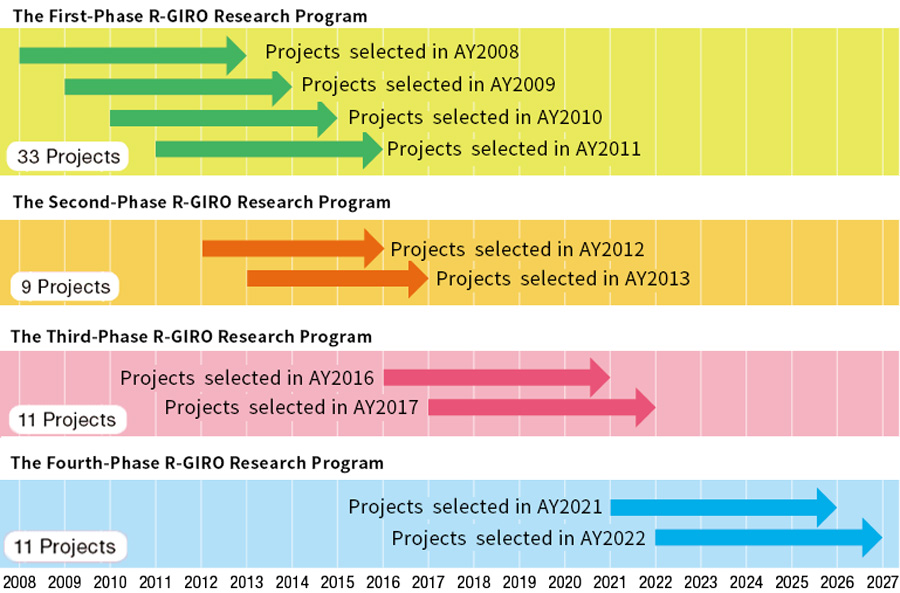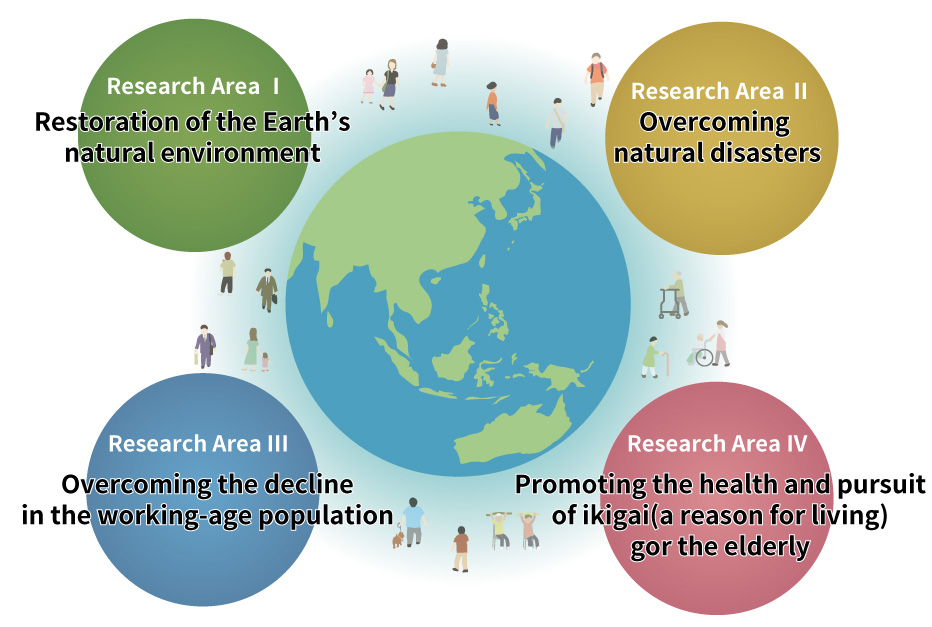PHILOSOPHY
To address the challenges of the 21st century, we will aim for “knowledge integration” and expand our activities.t
[Profile]
Sadao Kawamura
Ritsumeikan Global Innovation Research Organization (R-GIRO)
Acting Senior Executive Director and Eminent Research Professor
Founding Philosophy of Ritsumeikan Global Innovation Research Organization (R-GIRO):
The 20th century is known as the “century of science and technology.” Advanced technology based on science has partially enabled us to achieve goals such as fulfilling material desires and longevity, that we sought in the previous century.
Visions from 100 years ago, such as living in spaces with constant comfortable temperatures and humidity, traveling to distant places on Earth in a short span of time, and conversing face-to-face with people located far away, are being realized ever since the last century until today.
However, the benefits of science and technology are limited to a select few living in developed countries. These benefits are associated with issues such as global warming, resource depletion, and food shortage. Additionally, the 20th century has left several extremely negative legacies for this century such as the polarization of wealth, intensification of religious conflicts, and the limitations of a capitalist society based on market principles.
We must resolve these negative legacies to realize a sustainable world where human beings can live happily. Since the beginning of the 21st century, such awareness has been shared by many individuals, but the challenges are yet to be completely addressed.
To address these challenges, innovative scientific and technological efforts that are not an extension of conventional methods, and knowledge integration from cross-disciplinary activities in the fragmented fields of science and technology, are deemed important. In either case, universities, especially comprehensive universities that offer courses in many different fields, should fulfill their responsibilities of generating and passing down knowledge.
At Ritsumeikan University, to fulfill such a mission, we established the Ritsumeikan Global Innovation Research Organization (R-GIRO) in 2008.
This organization is directly under the jurisdiction of the President and has implemented about 10 research projects every phase covering the fields of humanities, social sciences, and natural sciences to address problems. In the first phase, there are advanced projects with research subjects spanning 10 areas, such as “environment,” “energy,” “food,” “materials/resources,” “medical/health,” and “safety/security,”—urgent issues that must be resolved in the 21st century.
In this organization, each project is conducted using the university's independent budget for the urgent resolution of 21st-century issues. If these activities produce satisfactory results, it is expected that global research bases will be developed.
Additionally, the organization has another aim, to nurture young researchers through the research activities of each project. A large portion of the university's independent budget is allocated to young researchers’ development.
The issues we target are extremely complex, and the path resolution is expected to be challenging. However, we aim to get closer to achieving our goals by forming interdisciplinary teams that go beyond the walls of departments within the university. For problem-solving, collaborative research with researchers outside the university and with external businesses are extremely important; and we are actively promoting them.
We would like to expand our activities towards solving the challenges of the 21st century together, with everyone.
The status and characteristics of the 4th phase:
The 4th phase of R-GIRO was initiated in 2021. In four research areas—restoration of the Earth's natural environment, overcoming natural disasters, overcoming the decline in the working-age population, and promoting the health and pursuit of Ikigai (a reason for living) for the elderly—11 research projects have commenced.
Usually, information exchange and research promotion between departments at universities are rare, but to solve the challenges of the 21st century, efforts that go beyond the walls of departments are crucial. Therefore, based on the experiences gathered from the 1st to the 3rd phases, we have introduced a system that can realize interdisciplinary collaboration more efficiently than before. In the 4th phase, interdisciplinary collaboration is progressing between academic areas that are generally considered to be separate. We expect that these efforts will pave the way for a new phase.
On the employment of young researchers
In R-GIRO, the key focus is on being able to employ young researchers for each project. Since public recruitment is directed globally and not only graduates of Ritsumeikan University, applicants from inside and outside the country are also able to participate, resulting in the involvement of a diverse group of young researchers from different countries.
In these projects, these young researchers hone their abilities and make new discoveries. Their abilities and achievements are recognized for their worth, and after the projects are completed, many of them take new steps by venturing into other universities, research institutions, and companies, in Japan as well as abroad.
This kind of nurturing of young researchers is one of the main purposes of R-GIRO, and steady results are being noticed.
On partnering with industry, government agencies, and others:
The purpose of R-GIRO is to solve problems on a global scale. Problems always exist in society and cannot be addressed simply by staying inside the university and writing papers. It is necessary to implement their practical applications through the cooperation of external companies, society, and various organizations. For this purpose, at times we collaborate with companies, start businesses, and collaborate with local and national public entities.
It is crucial to provide the ideas we have conceived and to actually proceed towards solving societal problems. Without this, it cannot be said that R-GIRO has succeeded.
Currently, owing to collaborations with companies, results are beginning to show in some cases. Of course, many issues are large, complex, and difficult, and it will not be easy to reach a resolution. What we do at R-GIRO may be a small step but is meaningful in order to move forward little by little. Going forward, we would like to continue advancing our efforts with the support and cooperation of stakeholders outside academia.
077-561-3488 (9:00-17:30 on weekdays)
072-665-2570 (9:00-17:30 on weekdays)
075-465-8224 (9:00-17:30 on weekdays)

